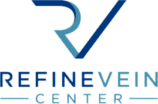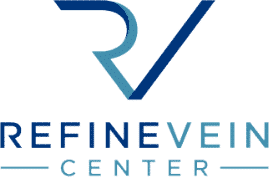Varicose veins are not merely a cosmetic concern. They can be uncomfortable, painful, and even signal deeper vein health issues. Millions of Americans are affected by this condition, especially women and older adults, but many people still don’t fully understand what varicose veins are, why they form, or when to seek treatment.
At Refine Vein Center, we’re committed to helping you better understand your vein health so you can make informed decisions about your care. Here’s a breakdown of varicose veins, their causes, symptoms, and how they can be treated.
What Are Varicose Veins?
Varicose veins are enlarged, twisted veins that are often visible just beneath the surface of the skin. They occur most commonly in the legs and feet due to the pressure of standing and walking upright, which increases the pressure in the veins of your lower body.
These veins appear dark purple or blue and may bulge or look rope-like. While some people experience no symptoms, others report aching pain, heaviness, swelling, or itching around the affected veins. In more severe cases, varicose veins can lead to ulcers or blood clots.
What Causes Varicose Veins?
Varicose veins develop when the valves inside the veins malfunction. Healthy veins have one-way valves that keep blood flowing toward the heart. When these valves become weak or damaged, blood can flow backward and pool in the vein, causing it to stretch and become varicose.
There are several factors that can increase your risk of developing varicose veins:
- Age – As we get older, our veins begin to lose their elasticity, and valves may not function as effectively, making aging one of the leading contributors to varicose vein development.
- Gender – Women are more likely than men to develop varicose veins. Hormonal changes during pregnancy, menstruation, and menopause may contribute. Further, hormone treatments, including birth control, can increase risk.
- Pregnancy – During pregnancy, blood volume increases to support the growing fetus, but this can also enlarge veins. Additionally, the pressure of the uterus on the pelvic veins can worsen varicose veins.
- Genetics – If your parents or grandparents had varicose veins, your chances are higher, too.
- Lifestyle – Prolonged standing or sitting, obesity, and sedentary lifestyle all contribute to poor vein health.
What Do Varicose Veins Feel Like?
For many, varicose veins are a visual concern. But for others, they bring persistent discomfort. Symptoms may include:
- Aching or throbbing in the legs
- Heaviness or fatigue, especially after long periods of standing
- Swelling in the lower legs and ankles
- Itching near the veins
- Nighttime leg cramps or restless legs
- Skin discoloration around the vein area
If left untreated, varicose veins can lead to complications like venous ulcers, bleeding, and chronic venous insufficiency (CVI), a long-term condition where blood pools in the legs instead of flowing back to the heart.
When Should You See a Vein Specialist?
You don’t need to wait until symptoms are unbearable to see a vein specialist. In fact, early treatment can prevent long-term damage and improve your quality of life. Consider scheduling a consultation at Refine Vein Center if:
- You experience pain, throbbing, or swelling in your legs
- Your veins are visibly bulging, twisted, or discolored
- You’ve developed sores or ulcers near your ankles
- You’re concerned about the cosmetic appearance of your legs
- You have a family history of vein disease
Book your appointment today and get your vein health on track.
How Are Varicose Veins Diagnosed?
At Refine Vein Center, we use advanced ultrasound imaging to examine your veins in detail. This diagnostic tool allows us to assess how well your blood is flowing and identify any faulty valves or areas of pooling.
Ultrasound exams are quick, non-invasive, and painless, and they give us the information we need to develop a personalized treatment plan for you.
What Are Your Treatment Options?
Thanks to advances in modern technology, varicose vein treatments are easier and less invasive than ever before. Refine Vein Center offers several state-of-the-art options to help patients feel better and look better, including:
- Endovenous Laser Ablation (EVLA) – A minimally invasive procedure where an FDA-approved laser fiber is placed inside an abnormal vein. Laser energy is then used to close off the affected vein, redirecting blood flow to healthier veins.
- Radiofrequency Ablation (RFA) – A minimally invasive procedure in which an FDA-approved catheter is inserted into the affected vein. Radiofrequency energy is then delivered to heat and seal the abnormal vein, similar to endovenous laser ablation (EVLA), redirecting blood flow to healthier veins.
- Varithena® Treatment – An FDA-approved injectable treatment for abnormal veins. Guided by ultrasound, Varithena is typically administered in a single session; however, additional treatments may be required depending on the number or size of your veins.
- Ultrasound Guided Sclerotherapy – Also known as endovenous chemical ablation, is a minimally invasive procedure that uses ultrasound imaging to guide the injection of a sclerosant solution into abnormal veins. This solution causes the targeted veins to close permanently, allowing blood to be naturally redirected to healthier, functioning veins.
Each treatment is tailored to your specific condition, lifestyle, and goals. Many patients are surprised to learn that these treatments require little to no downtime and can significantly improve both symptoms and appearance.
Can Varicose Veins Be Prevented?
While you can’t always prevent varicose veins, especially if you have a genetic predisposition, there are steps you can take to reduce your risk or delay their onset:
- Stay Active – Walking and exercising regularly improves your circulation and strengthens your leg muscles, which help veins do their job.
- Maintain a Healthy Weight – Excess weight adds pressure to your veins.
- Avoid Prolonged Standing or Sitting – Move around every 30 minutes to promote healthy blood flow.
- Wear Compression Socks – These can help prevent blood from pooling in the veins.
Don’t Let Varicose Veins Control Your Life
Whether you’re feeling self-conscious about how your legs look or struggling with pain and swelling, you don’t have to live with varicose veins. At Refine Vein Center, we specialize in treating venous disease with compassion, expertise, and the latest technology.
Our goal is to help you reclaim your comfort, mobility, and confidence.
Book your appointment today and take the first step toward healthier veins and a better quality of life.



